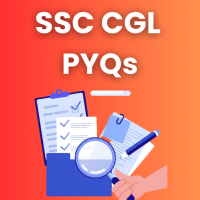SSC CGL Exam > SSC CGL Questions > Which is the accurate indirect speech for: "H...
Start Learning for Free
Which is the accurate indirect speech for: "He said, 'I might come to the party if I finish work early'"?
- a)He said that he might come to the party if he finished work early.
- b)He said that he might come to the party if he finishes work early.
- c)He said that he might come to the party if he will finish work early.
- d)He said that he might come to the party if he would finish work early.
Correct answer is option 'A'. Can you explain this answer?
Verified Answer
Which is the accurate indirect speech for: "He said, 'I might come to ...
In indirect speech, the modal "might" remains unchanged, but the verb tense changes to past in the subordinate clause. Therefore, the correct transformation is "He said that he might come to the party if he finished work early."
View all questions of this test
Most Upvoted Answer
Which is the accurate indirect speech for: "He said, 'I might come to ...
Understanding the Indirect Speech Transformation
When converting direct speech to indirect speech, it's essential to maintain the original meaning while adjusting the verb tenses and pronouns as necessary.
Original Statement
- "He said, 'I might come to the party if I finish work early.'"
Analysis of Options
- Option a: He said that he might come to the party if he finished work early.
- This option is correct because the past tense "finished" aligns with the indirect speech structure after "he said." The modal "might" remains unchanged, indicating a possibility.
- Option b: He said that he might come to the party if he finishes work early.
- Incorrect because "finishes" is present tense and does not fit the past context established by "he said."
- Option c: He said that he might come to the party if he will finish work early.
- Incorrect as "will finish" is future tense, not suitable for indirect speech following "he said."
- Option d: He said that he might come to the party if he would finish work early.
- Incorrect because "would finish" implies a conditional mood that distorts the original meaning.
Conclusion
The correct answer is option a, as it accurately reflects the necessary changes in tense while preserving the meaning of the original statement.
When converting direct speech to indirect speech, it's essential to maintain the original meaning while adjusting the verb tenses and pronouns as necessary.
Original Statement
- "He said, 'I might come to the party if I finish work early.'"
Analysis of Options
- Option a: He said that he might come to the party if he finished work early.
- This option is correct because the past tense "finished" aligns with the indirect speech structure after "he said." The modal "might" remains unchanged, indicating a possibility.
- Option b: He said that he might come to the party if he finishes work early.
- Incorrect because "finishes" is present tense and does not fit the past context established by "he said."
- Option c: He said that he might come to the party if he will finish work early.
- Incorrect as "will finish" is future tense, not suitable for indirect speech following "he said."
- Option d: He said that he might come to the party if he would finish work early.
- Incorrect because "would finish" implies a conditional mood that distorts the original meaning.
Conclusion
The correct answer is option a, as it accurately reflects the necessary changes in tense while preserving the meaning of the original statement.

|
Explore Courses for SSC CGL exam
|

|
Question Description
Which is the accurate indirect speech for: "He said, 'I might come to the party if I finish work early'"?a)He said that he might come to the party if he finished work early.b)He said that he might come to the party if he finishes work early.c)He said that he might come to the party if he will finish work early.d)He said that he might come to the party if he would finish work early.Correct answer is option 'A'. Can you explain this answer? for SSC CGL 2025 is part of SSC CGL preparation. The Question and answers have been prepared according to the SSC CGL exam syllabus. Information about Which is the accurate indirect speech for: "He said, 'I might come to the party if I finish work early'"?a)He said that he might come to the party if he finished work early.b)He said that he might come to the party if he finishes work early.c)He said that he might come to the party if he will finish work early.d)He said that he might come to the party if he would finish work early.Correct answer is option 'A'. Can you explain this answer? covers all topics & solutions for SSC CGL 2025 Exam. Find important definitions, questions, meanings, examples, exercises and tests below for Which is the accurate indirect speech for: "He said, 'I might come to the party if I finish work early'"?a)He said that he might come to the party if he finished work early.b)He said that he might come to the party if he finishes work early.c)He said that he might come to the party if he will finish work early.d)He said that he might come to the party if he would finish work early.Correct answer is option 'A'. Can you explain this answer?.
Which is the accurate indirect speech for: "He said, 'I might come to the party if I finish work early'"?a)He said that he might come to the party if he finished work early.b)He said that he might come to the party if he finishes work early.c)He said that he might come to the party if he will finish work early.d)He said that he might come to the party if he would finish work early.Correct answer is option 'A'. Can you explain this answer? for SSC CGL 2025 is part of SSC CGL preparation. The Question and answers have been prepared according to the SSC CGL exam syllabus. Information about Which is the accurate indirect speech for: "He said, 'I might come to the party if I finish work early'"?a)He said that he might come to the party if he finished work early.b)He said that he might come to the party if he finishes work early.c)He said that he might come to the party if he will finish work early.d)He said that he might come to the party if he would finish work early.Correct answer is option 'A'. Can you explain this answer? covers all topics & solutions for SSC CGL 2025 Exam. Find important definitions, questions, meanings, examples, exercises and tests below for Which is the accurate indirect speech for: "He said, 'I might come to the party if I finish work early'"?a)He said that he might come to the party if he finished work early.b)He said that he might come to the party if he finishes work early.c)He said that he might come to the party if he will finish work early.d)He said that he might come to the party if he would finish work early.Correct answer is option 'A'. Can you explain this answer?.
Solutions for Which is the accurate indirect speech for: "He said, 'I might come to the party if I finish work early'"?a)He said that he might come to the party if he finished work early.b)He said that he might come to the party if he finishes work early.c)He said that he might come to the party if he will finish work early.d)He said that he might come to the party if he would finish work early.Correct answer is option 'A'. Can you explain this answer? in English & in Hindi are available as part of our courses for SSC CGL.
Download more important topics, notes, lectures and mock test series for SSC CGL Exam by signing up for free.
Here you can find the meaning of Which is the accurate indirect speech for: "He said, 'I might come to the party if I finish work early'"?a)He said that he might come to the party if he finished work early.b)He said that he might come to the party if he finishes work early.c)He said that he might come to the party if he will finish work early.d)He said that he might come to the party if he would finish work early.Correct answer is option 'A'. Can you explain this answer? defined & explained in the simplest way possible. Besides giving the explanation of
Which is the accurate indirect speech for: "He said, 'I might come to the party if I finish work early'"?a)He said that he might come to the party if he finished work early.b)He said that he might come to the party if he finishes work early.c)He said that he might come to the party if he will finish work early.d)He said that he might come to the party if he would finish work early.Correct answer is option 'A'. Can you explain this answer?, a detailed solution for Which is the accurate indirect speech for: "He said, 'I might come to the party if I finish work early'"?a)He said that he might come to the party if he finished work early.b)He said that he might come to the party if he finishes work early.c)He said that he might come to the party if he will finish work early.d)He said that he might come to the party if he would finish work early.Correct answer is option 'A'. Can you explain this answer? has been provided alongside types of Which is the accurate indirect speech for: "He said, 'I might come to the party if I finish work early'"?a)He said that he might come to the party if he finished work early.b)He said that he might come to the party if he finishes work early.c)He said that he might come to the party if he will finish work early.d)He said that he might come to the party if he would finish work early.Correct answer is option 'A'. Can you explain this answer? theory, EduRev gives you an
ample number of questions to practice Which is the accurate indirect speech for: "He said, 'I might come to the party if I finish work early'"?a)He said that he might come to the party if he finished work early.b)He said that he might come to the party if he finishes work early.c)He said that he might come to the party if he will finish work early.d)He said that he might come to the party if he would finish work early.Correct answer is option 'A'. Can you explain this answer? tests, examples and also practice SSC CGL tests.

|
Explore Courses for SSC CGL exam
|

|
Signup for Free!
Signup to see your scores go up within 7 days! Learn & Practice with 1000+ FREE Notes, Videos & Tests.


















